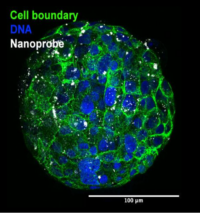Minutia receives award from JDRF to further develop real-time monitoring platform for cell therapies
Minutia – Berkeley, California![]()
Press contact: press@minutia.co , media@jdrf.org ![]()
Minutia, Inc., an innovative Oakland and Berkeley-based life sciences startup, announced today an award from JDRF International (JDRF) to help advance Minutia’s mission to create a functional cure for type 1 diabetes (T1D). The award will directly fund Minutia’s ongoing work with subcutaneous transplants of insulin-producing cells. Specifically, the award supports further development of Minutia’s proprietary real-time monitoring platform’s ability to assess and modify transplant health post-engraftment in patients with T1D.
“We are honored to begin this collaboration with JDRF,” stated Katy Digovich, Minutia’s co-founder and CEO. “As someone who has been living with type 1 diabetes for over 30 years, I have followed the cutting edge work of JDRF since I was young. It is so exciting to get to work with and learn from their team.”
 “JDRF is committed to developing cell replacement therapies for type 1 diabetes,” said Jaime Giraldo, Ph.D., JDRF associate director of research. “Minutia’s efforts to develop a way to non-invasively assess the health of transplanted cells is an important step in making these therapies a reality.”
“JDRF is committed to developing cell replacement therapies for type 1 diabetes,” said Jaime Giraldo, Ph.D., JDRF associate director of research. “Minutia’s efforts to develop a way to non-invasively assess the health of transplanted cells is an important step in making these therapies a reality.”
Housed in the Bakar BioEnginuity Hub at the University of California, the company began operations in January 2021, and has already demonstrated the efficacy of their robust insulin-producing cells and their intracellular sensors in animal models. In addition, Minutia has a proof of concept of their less-invasive transplant protocol in a PI-led hase I/II clinical trial.
Coupled with previous grant funding from the California Institute of Regenerative Medicine, JDRF’s award supports Minutia’s technology for potential development as a therapeutic in T1D.
About Minutia
At Minutia we are working on creating the first functional cure that can be given broadly for Type 1 diabetes through subcutaneous transplants of immune evasive insulin-producing cells managed in real-time by our proprietary cell-based sensors. We combine our cells with proprietary co-factors that help with engraftment and cell survival and monitor our cells for common transplant assaults to customize for engraftment success. Minutia is co-founded and led by people living with T1D, this is a product we will put in our bodies and the bodies of people we love.
About JDRF
JDRF’s mission is to accelerate life-changing breakthroughs to cure, prevent and treat T1D and its complications. To accomplish this, JDRF has invested more than $2.5 billion in research funding since our inception. We are an organization built on a grassroots model of people connecting in their local communities, collaborating regionally and globally for efficiency and broader fundraising impact, and uniting on a global stage to pool resources, passion, and energy. We collaborate with academic institutions, policymakers, and corporate and industry partners to develop and deliver a pipeline of innovative therapies to people living with T1D. Our staff and volunteers throughout the United States and our five international affiliates are dedicated to advocacy, community engagement, and our vision of a world without T1D. For more information, please visit jdrf.org or follow us on Twitter (@JDRF), Facebook (@myjdrf), and Instagram (@jdrfhq).
About Type 1 Diabetes (T1D)
T1D is an autoimmune condition that causes the pancreas to make very little insulin or none at all. This leads to dependence on insulin therapy and the risk of short or long-term complications, which can include highs and lows in blood sugar; damage to the kidneys, eyes, nerves, and heart; and even death if left untreated. Globally, it impacts nearly 9 million people. Many believe T1D is only diagnosed in childhood and adolescence, but diagnosis in adulthood is common and accounts for nearly 50% of all T1D diagnoses. The onset of T1D has nothing to do with diet or lifestyle. While its causes are not yet entirely understood, scientists believe that both genetic factors and environmental triggers are involved. There is currently no cure for T1D.
###